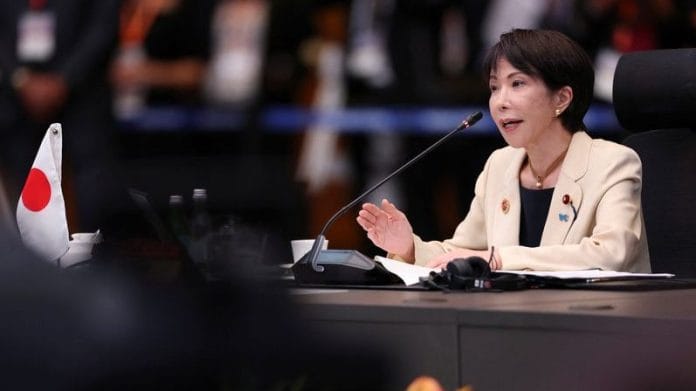A single remark by Japan’s new prime minister, Sanae Takaichi, has sparked an intense wave of discussion across the Chinese internet. Her comments, suggesting that a Chinese attack on Taiwan could pose an existential challenge for Japan and justify collective self-defence, quickly surged to the top of Baidu’s trending list. Chinese commentators and internet users are now debating why the statement was not retracted, and what it might signal for Japan and the region.
The rapid, emotionally charged reaction underscored not only Taiwan’s centrality in China’s public consciousness but also the enduring complexities of China–Japan relations, where historical memory, regional rivalry, and strategic anxieties remain tightly intertwined. Online, some users employed derogatory language, calling Takaichi a “vicious witch” and “evil”, as well as “emblematic of strategic short-sightedness”. Weibo hashtags such as “China has the legal right to strike Japan”, “Japanese Foreign Ministry official leaves Chinese Ministry of Foreign Affairs”, “Japan should give explanation to Chinese people”, “Japan should not misinterpret China’s stern warning”, and “Sanae Takaichi’s remarks remind China of more than 90 years ago” amassed views in several dozen lakhs.
Chinese analysts were quick to weigh in. One observer argued that the episode reflects longstanding concerns in China about Japan’s strategic outlook and its perception of regional order. Su Xiaohui, associate researcher at the China Institute of International Studies, suggested that Japan is seeking a higher profile in Asia-Pacific security by shaping great-power competition and encouraging bloc-based alignments with Taiwan. She added that multi-sea linkages are part of a broader regional recalibration.
Lin Boyao, former director of the China Overseas Friendship Association and representative at the China-Japan Exchange Promotion Association, wrote that Tokyo’s strategic focus on Taiwan is increasingly interpreted in Chinese discourse as part of a wider effort to reshape regional dynamics.
Rising China-Japan tensions
The first official reaction came from Xue Jian, China’s consul general in Osaka, whose now-deleted post on X drew widespread attention online. “The dirty neck that sticks itself in must be cut off,” the post read.
The threatening language resonated with nationalist sentiment, amplified by posts on Bilibili, Zhihu, and Weibo. “If beheading is just an appetizer, then national destruction is a meal better suited to the Japanese physique,” read one such post.
Soon after, China’s Ministry of Culture and Tourism issued a travel advisory discouraging visits to Japan. At the same time, sightings of Chinese vessels in the Strait of Japan were widely interpreted by the Chinese as a show of resolve.
Across Chinese social media, the response was praised as firm and decisive. Many framed it as a demonstration of China’s readiness to defend national interests and control the narrative. Popular posts highlighted the speed and intensity of Beijing’s measures, with some users noting that Japan appeared caught off guard. A Weibo user criticised Chinese tourists who continued to travel to Japan, arguing that solidarity with national priorities should outweigh leisure considerations.
Economic impact quickly became a central theme in the discussion. Chinese tourists are Japan’s largest foreign visitor group, and airline cancellations surged following the remarks. Posts across the Chinese social media shared the report stating that roughly 4,91,000 bookings were cancelled—about 32 per cent of total reservations.
In September, over 7,76,000 Chinese visitors had travelled to Japan. The People’s Daily reported on 18 November that tourists from mainland China, “Taiwan”, and Hong Kong accounted for 42.5 per cent of Japan’s ¥8.1 trillion in tourism revenue.
Amid rising tensions, Masaaki Kanai, director of the Asia and Oceania Bureau of Japan’s Ministry of Foreign Affairs, visited Beijing on 18 November to meet Liu Jinsong, director of China’s Asia Department. Chinese internet users scrutinised his body language, and images of him walking with ‘a gloomy face’ and his head bowed circulated widely. These were interpreted as symbolising the seriousness with which Beijing’s response was received.
Hu Xijin, former editor-in-chief of the Global Times, has unleashed a flurry of posts on Weibo, warning that escalating tensions could trigger a serious economic and strategic shock for Japan. He cautioned that a cutoff of Chinese exports, particularly rare earths and fertilisers, could cripple Japan’s high-tech industries and threaten its food security. He described Takaichi’s behaviour as political sleepwalking and urged Japanese leaders to become more self-aware.
Also read: India has to move on now. Engage with ‘Nooton Bangladesh’
Past wounds
According to many Chinese observers, the episode touches on far more than Taiwan alone. The use of the term “existential crisis” reminds them of historical periods of regional conflict and Japanese militarism. Commentators pointed out that similar language was used in the 1930s and 1940s and left deep scars in Chinese public consciousness.
A widely shared Weibo post suggested that contemporary developments may, paradoxically, accelerate reunification across the Taiwan Strait.
The spat underscores the emotional and strategic complexity of China–Japan relations. Today’s tensions cannot be separated from historical memory, regional rivalry, and perceptions of strategic intent. China’s immediate countermeasures to Takaichi’s remarks reveal its deep anxieties. The potential revival of Shinzo Abe-era security thinking in Japan, growing international support for Taiwan, and Tokyo’s renewed push to shape Indo-Pacific security all feed into Beijing’s broader sense of unease.
From the early days of Takaichi’s premiership, China has appeared determined to set the agenda for engagement so that Japan is discouraged from making historical issues and Taiwan central topics in the ties. And the episode highlights the wide array of tools Beijing can deploy to signal resolve when its so-called red lines are crossed. Chinese online discourse underscores that Beijing is prepared to weaponise tools such as tourism and diaspora networks to advance its strategic interests.
Sana Hashmi is a fellow at the Taiwan Asia Exchange Foundation. She tweets @sanahashmi1. Views are personal.
(Edited by Prasanna Bachchhav)






